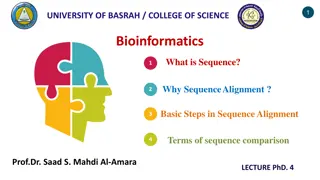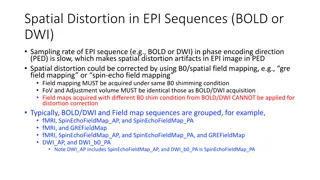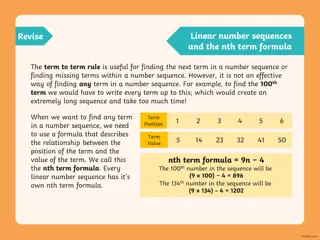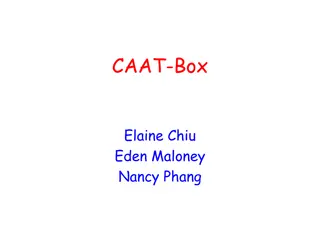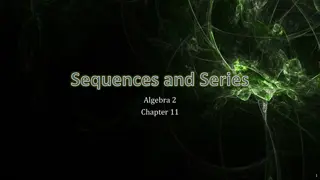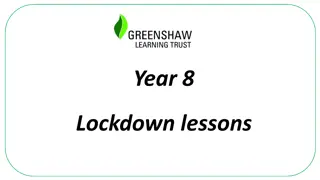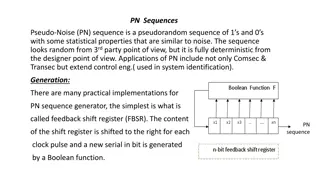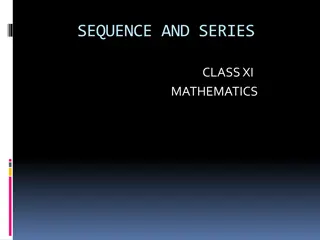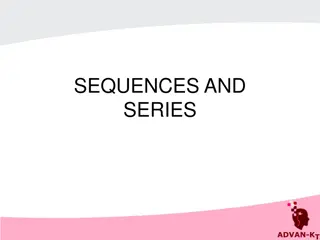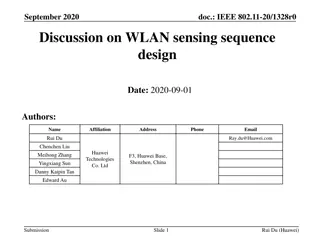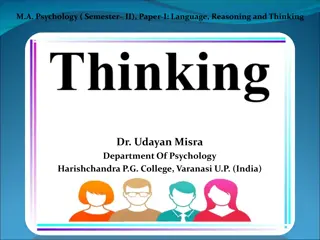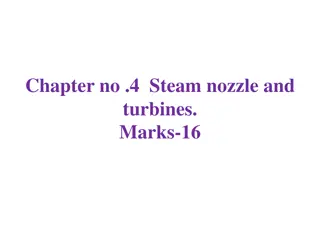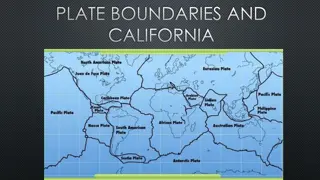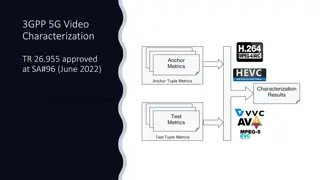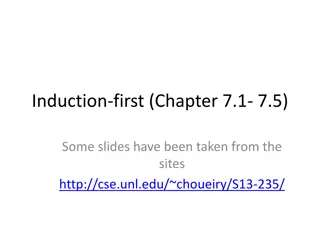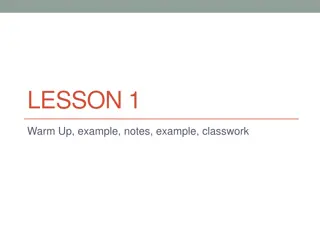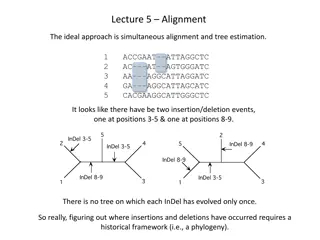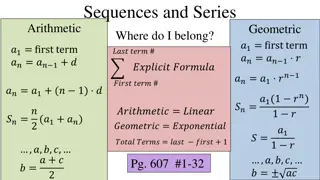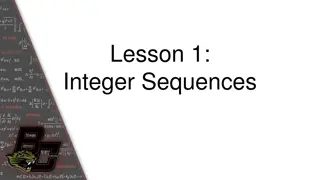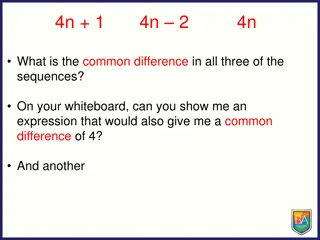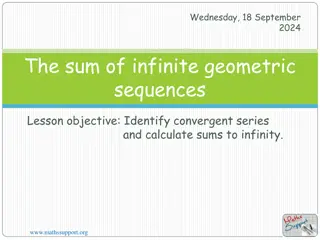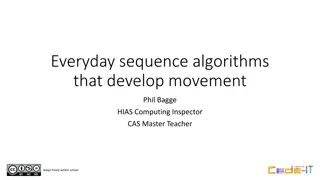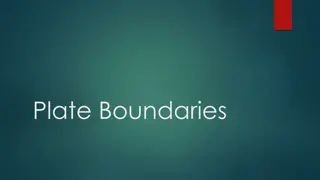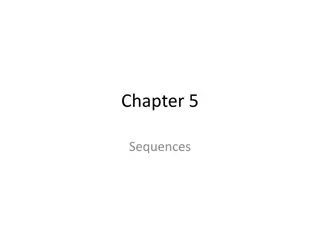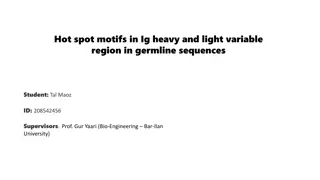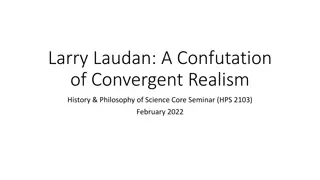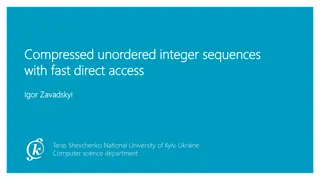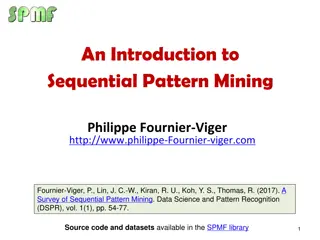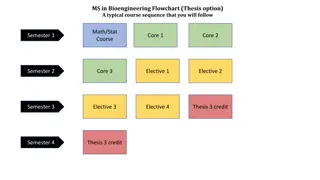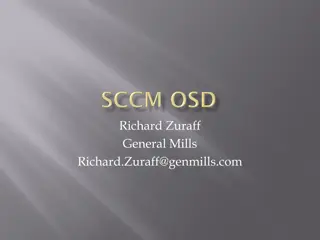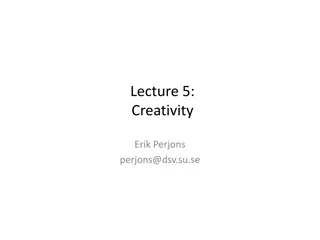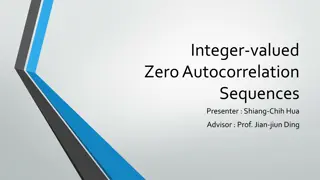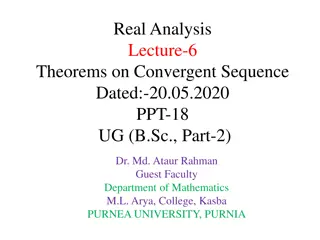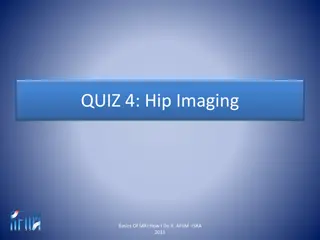Bioinformatics
Bioinformatics involves analyzing biological sequences through sequence alignment to uncover functional, structural, and evolutionary insights. This process helps in tasks like annotation of sequences, modeling protein structures, and analyzing gene expression experiments. Basic steps include compar
0 views • 6 slides
Spatial Distortion Correction in EPI Sequences: Field Mapping Examples
Spatial distortion artifacts in EPI sequences (BOLD or DWI) due to slow sampling rates in the phase encoding direction can be corrected using B0/spatial field mapping techniques. This correction requires obtaining field maps under the same B0 shimming conditions and with identical FoV and adjustment
0 views • 4 slides
Understanding Linear Number Sequences and the Nth Term Formula
In mathematics, linear number sequences can be described using the nth term formula, which helps in predicting sequences and finding specific terms without generating the entire sequence. By understanding the relationship between term positions and values, one can efficiently determine any term with
1 views • 15 slides
Understanding Transcription Factors and Regulatory Sequences in Gene Expression
Transcription factors play a crucial role in gene expression by controlling the recruitment of RNA polymerase. Promoter regions contain sequences like CAAT box and TATA box that regulate transcription by binding proteins. Consensus sequences are conserved patterns in the genome with various biologic
2 views • 10 slides
Understanding Sequences and Series in Algebra 2
Dive into the concept of sequences and series in Algebra 2 with examples and diagrams from the Big Ideas Algebra 2 textbook by Larson, R., and Boswell (2022). Explore the progression of values and patterns in sequences, and learn about the sum of series to enhance your understanding of this fundamen
1 views • 58 slides
Mastering Sequences in Mathematics
Delve into the world of mathematical sequences with this comprehensive guide. Explore what sequences are, different types like arithmetic and geometric, rules for continuing sequences, methods to find specific terms, and understanding position-to-term rules to solve for nth terms efficiently.
0 views • 17 slides
Understanding Pseudo-Noise Sequences and Applications
Pseudo-Noise (PN) sequences are deterministic yet appear random, with applications in various fields such as communication security, control engineering, and system identification. Generated using shift registers, they exhibit statistical properties akin to noise. Linear and nonlinear feedback shift
1 views • 19 slides
Understanding Sequences and Series in Mathematics
Sequences and series are fundamental concepts in mathematics, with sequences consisting of terms denoted as a1, a2, a3, ... and series involving the sum of terms in arithmetic and geometric progressions. Learn about arithmetic progression, geometric progression, terms, and formulas for finding sums
1 views • 11 slides
Understanding Sequences and Series
Exploring the concepts of sequences and series in mathematics, including definitions, examples, and exercises on arithmetic sequences, geometric progressions, and general terms. Learn about generating sequences, finding nth terms, common differences, and common ratios in different types of sequences
0 views • 20 slides
Discussion on WLAN Sensing Sequence Design in IEEE 802.11-20/1328r0
This presentation by Rui Du from Huawei discusses the design of sequences for WLAN sensing in IEEE 802.11 standards. It covers topics such as existing sequences, analysis of sequences, ambiguity functions, Golay sequences, and properties adopted for communication sequence design.
4 views • 14 slides
Understanding Different Types of Thinking in Psychology
Thinking is a complex mental process that involves manipulation of information to find solutions or make decisions. This process includes concepts, propositions, and images and can be goal-oriented and influenced by past experiences. Different types of thinking include Autistic, Realistic, Convergen
1 views • 10 slides
Understanding Steam Nozzles and Turbines
Learn about the construction and working of steam nozzles, governors, steam turbines, and heat exchangers. Discover the equations of continuity for fluid flow and understand the functions and types of steam nozzles. Explore convergent and divergent nozzles and their applications in various engineeri
0 views • 70 slides
Plate Boundaries and Geological Events in California
California is located on a plate boundary experiencing major geologic events. The state's landforms are shaped by plate tectonic activity. Understanding stress types at plate boundaries can help prevent damage and save lives. The interaction at plate boundaries plays a crucial role in shaping Earth'
0 views • 14 slides
5G Video Characterization: Reference Sequences and Metrics
Scenarios and anchor generation for various video codecs used in 5G services are detailed, along with reference sequences for different applications like Full HD streaming, 4K-TV, screen content, and more. Tools and repositories for accessing reference sequences are provided, and metrics for evaluat
0 views • 15 slides
Understanding Sequences in Mathematics
Explore arithmetic, geometric, and Fibonacci sequences along with their general forms and properties. Learn how to define sequences and terms, and understand the concepts of indices and common differences/common ratios.
0 views • 51 slides
Sequences and Patterns in Mathematics
Dive into the world of sequences and patterns with examples and exercises involving identifying patterns, writing formulas, and graphing terms on coordinate planes. Explore different scenarios and learn to express nth terms in sequences. Understand the importance of indexing terms and using proper f
0 views • 48 slides
Interactive Role-Shifting Narrative Sequences
Explore a collection of interactive narrative sequences focusing on role-shifting scenarios, falls, and trip/fall sequences. Discover various story elements like location descriptions, object passing, outcomes, and reactions. Engage with different scenarios to enhance storytelling skills and creativ
0 views • 17 slides
Understanding Equivalent Ratios and Linear Sequences for Problem Solving
Learn how to identify and work with equivalent ratios, spot linear sequences, and solve problems using ratios. Practice simplifying ratios, correcting work, and applying ratios in real-life scenarios. Explore scenarios like sharing sweets between Alice and Bert to strengthen your understanding of ra
0 views • 19 slides
Progressive Alignment Overview in Phylogenetics
In the field of phylogenetics, the process of progressive alignment is crucial for aligning sequences and building evolutionary trees. This approach involves generating pairwise alignments, estimating distances, constructing guide trees, and aligning sequences progressively based on the tree. Needle
0 views • 12 slides
Exploring Sequences and Series in Mathematics
Delve into the world of sequences and series, understanding the concepts of arithmetic and geometric progressions. Learn to identify finite and infinite sequences, explore various patterns, and model them mathematically. From arithmetic to geometric, finite to infinite, this content offers a compreh
0 views • 52 slides
Plate Tectonics: Evolution of the Earth
Explore the dynamic process of plate tectonics shaping the Earth's crust through the movement of tectonic plates, subduction zones, divergent and convergent boundaries. Discover how seafloor spreading creates new oceanic crust, and learn about the geological features formed by these processes.
0 views • 25 slides
Understanding Integer Sequences and Terms
Explore the concepts of integer sequences, including infinite and finite sequences, terms of a sequence, and nth term formulas. Learn to classify sequences as finite or infinite and find specific terms in a sequence. Gain a comprehensive understanding of notation and terminology used for describing
3 views • 23 slides
Exploring Juggling Patterns and Sequences
Dive into the world of juggling with a detailed exploration of basic juggling patterns and sequences. Learn about the rules and rhythms that dictate juggling movements, including cascade and fountain patterns. Discover how variations in throw heights can change the dynamics of juggling sequences. Ex
0 views • 41 slides
Strategies for Effective Negotiation in Public Health
Understanding the principles of negotiation is crucial in public health settings. Negotiation involves parties with convergent or divergent interests engaging in a process to reach mutually beneficial outcomes. Key aspects include clarifying interests, identifying options, creating deal packages, an
0 views • 11 slides
Exploring Sequences and Patterns in Mathematics
Dive into the world of sequences and patterns by exploring expressions, common differences, and nth terms. Discover how to create sequences with specific common differences, identify terms within sequences, and use Venn diagrams to visualize different scenarios. Uncover the rules for constructing nt
0 views • 13 slides
Understanding Infinite Geometric Sequences and Convergent Series
Explore the concept of infinite geometric sequences in mathematics through the example of cutting a string into halves. Learn how to identify convergent series and calculate sums to infinity, distinguishing between convergent and divergent series based on the common ratio. Delve into the formula for
0 views • 12 slides
Everyday Movement Sequences for Physical Computing Activities
Explore a series of everyday movement algorithms designed to enhance physical computing skills. Develop your own sequences and follow along with various movements like standing, waving, bowing, jumping, spinning, and more. From basic movements to more complex actions, adapt and freely incorporate th
0 views • 11 slides
Exploring Plate Boundaries: Convergent, Divergent, and Transform Faulting
Delve into the world of plate boundaries by understanding convergent, divergent, and transform faulting. Discover various examples worldwide, describing their physical locations, major tectonic plates involved, resulting landforms, lithosphere types, and associated catastrophic events. Learn about t
0 views • 5 slides
Understanding Sequences in Database Management Systems
Sequences in a database are objects that generate unique numeric values automatically. They can be used to create primary key values and improve query performance. By defining sequences using the CREATE SEQUENCE statement in SQL, you can control the generation of sequential numbers with options like
0 views • 41 slides
Hot Spot Motifs in Ig Heavy and Light Variable Region Sequences
B cells express unique receptors to combat pathogens, with membrane-bound immunoglobulins forming their diverse repertoire. The regions of high variance, known as CDRs, play a crucial role in antigen binding. Ig genes contribute significantly to immune function, with recent studies revealing genetic
0 views • 13 slides
Critique of Convergent Realism by Larry Laudan
Larry Laudan's "A Confutation of Convergent Realism" challenges the notion of epistemic realism by arguing that historical evidence does not fully support it. He discusses Convergent Epistemological Realism (CER) and presents abductive arguments questioning the truth and empirical success of scienti
0 views • 18 slides
Advanced Compression Techniques in Unordered Integer Sequences
Presenting innovative methods for compressing and accessing unordered integer sequences efficiently. Explore fast element extraction and direct addressable variable-length codes to optimize memory usage and enhance data handling. Cutting-edge research from top universities and workshops is showcased
0 views • 8 slides
Introduction to Sequential Pattern Mining Overview
Discover the concept of sequential pattern mining, a popular data mining task introduced in 1994, with a focus on analyzing discrete sequences to find interesting patterns. Sequential pattern mining involves finding frequent subsequences in sets of discrete sequences, such as items purchased by cust
1 views • 24 slides
Typical Course Sequences in Bioengineering and Engineering Master's Programs
These flowcharts illustrate the typical course sequences for both thesis and non-thesis options in MS in Bioengineering, MD/E programs, and Master of Engineering degree. The sequences include core courses, electives, project courses, and thesis credits spread across semesters. Each program offers a
0 views • 5 slides
Understanding Mountain Building and Evolution of Continents
Mountain building, orogeny, and the formation of major mountain belts are key processes in the evolution of continents. This chapter delves into the geological mechanisms behind these phenomena, focusing on convergent boundaries, the American Cordillera, Alpine-Himalaya chain, and other significant
0 views • 50 slides
Optimizing SCCM Deployment Process With Task Sequences and Image Management
Explore the efficient utilization of SCCM task sequences, image packages, and deployment methods to streamline the deployment process. Learn about custom task sequences, software imaging strategies, and driver import considerations for successful deployments in an enterprise environment.
0 views • 21 slides
Exploring Creativity and Design Thinking Strategies
Understand the concepts of divergent and convergent thinking in creativity, the importance of empathetic thinking in design, and the role of lateral thinking in generating innovative ideas. Guidelines emphasize the need to allow sufficient time for divergent thinking to foster creative outcomes befo
0 views • 16 slides
Understanding Integer-Valued Zero Autocorrelation Sequences
Delve into the realm of integer-valued zero autocorrelation sequences, exploring concepts like periodic sequences, frequency domains, constant amplitudes, and more. Unravel the methods and techniques involved in creating these sequences and their significance in various applications.
0 views • 32 slides
Theorems on Convergent Sequences with Proofs and Examples
The lecture covers theorems on convergent sequences, including the convergence of monotonic increasing and decreasing sequences when bounded. Detailed proofs for these theorems are provided, along with examples to determine if a sequence is bounded. The presentation includes step-by-step explanation
0 views • 6 slides
Hip Imaging Basics: MRI Techniques and Sequences for Bilateral Examination
This content presents a quiz on hip imaging basics focusing on MRI techniques and sequences for bilateral examination. It covers topics such as appropriate positioning, the use of Propeller sequences, and the best choice of sequence for labral arthro-MR study. Images and questions related to hip ima
0 views • 15 slides
